|
Penny Dreadful, Season One Television review by Thomas M. Sipos |
|
MENU Books Horror Film Festivals and Awards
Pursuits
Blogs Horror Film Festivals and Awards
Other
|
Penny Dreadful (2014-16,
created by John Logan;
cast:
Eva Green, Timothy Dalton, Rory Kinnear, Josh Harnett, Billie
Piper, Harry Treadaway, Reeve Carney, Olivia Llewellyn, Simon
Russell Beale, Danny Sapini, Alun
Armstrong)
Showtime's Penny Dreadful (2014-2016) is a horror mashup, introducing new characters to those from classic horror tales. Dracula, Van Helsing, Mina Harker, Dorian Gray, Egyptian gods, Frankenstein and his monster, Jekyll and Hyde, Satan, witches, and a werewolf are all present. But the real monsters are Sin and Modernity, which attack, corrupt, but are eventually defeated by Christendom. The series opens in Victorian London, 1891. While the show features an ensemble cast, its central player is Vanessa Ives (Eva Green), a devout Catholic woman who, throughout the show's three seasons, is tempted by feminism and sexual liberation.
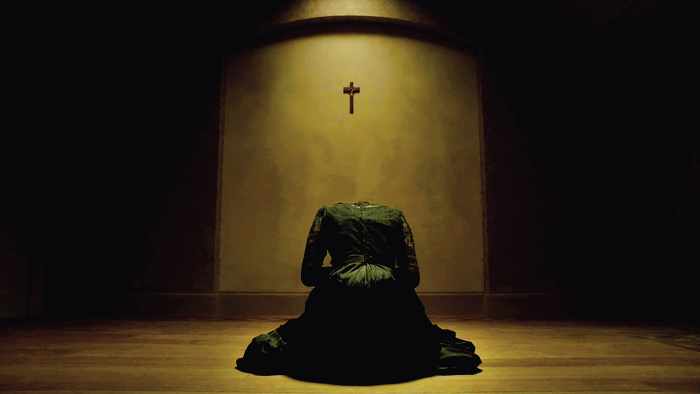
We first see Vanessa praying fervently in a dim room, walls bare but for a crucifix. Bent so low that from behind she appears headless. Vanessa suffers from a guilty conscience for having betrayed her best friend, Mina Murray (Olivia Llewellyn), daughter to Sir Malcolm Murray (Timothy Dalton). Years earlier, while still a child, Vanessa caught her mother committing adultery with Sir Malcolm in a garden maze. Seeing them shook her faith. "More than the shock, the sinfulness, the forbidden act, there was this. I enjoyed it. Something whispered. I listened." That "something" was Satan. Vanessa begins pilfering little things from Mina. Less for gain than for the thrill of sin. "In me there was a change. I marked it from that night in the hedge maze. Perhaps it was always there."
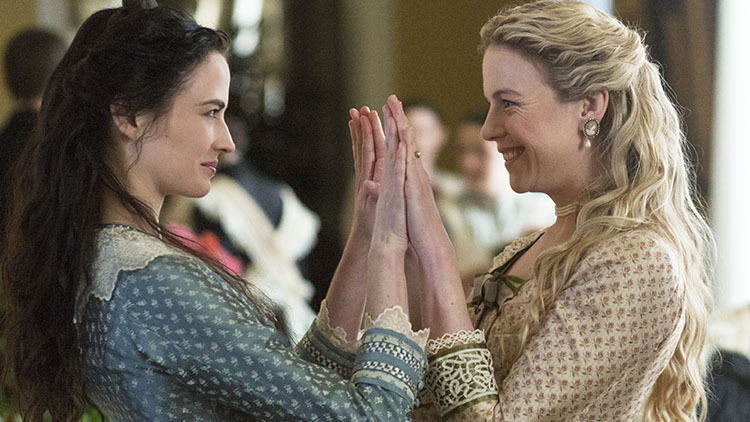 Vanessa's misdeeds worsen as she grows into adulthood. When Mina announces her engagement to a dashing officer, Vanessa is consumed by jealousy and resentment. "I watched your courtship with Captain Branson flourish. ... God, how I envied you. Perhaps I even hated you. How is it possible that you, always so meek and obliging, were to have this greatest of adventures before me? You would know love. You would know a man's touch, while I, the courageous one, knew nothing of life." Feminism often sprouts from such resentment toward a prettier rival. Attending a party on the night before the wedding, Vanessa thinks, "One more night as Miss Mina Murray before you became Mrs. Charles Branson. You didn't seem to mind this loss of self. Perhaps I minded it for you." To some extent, Vanessa is suppressing her Catholic guilt with feminist rationalization. She wishes to stop Mina's marriage not from jealously, but from concern for her well-being. To save Mina from a "loss of self" in the patriarchal institution of marriage. But Vanessa is also projecting. As we will learn, however much she craves passion and romance, she genuinely fears losing her autonomy in marriage. Later that night, Vanessa seduces Captain Branson (Joseph Millson). Mina catches the two lovers in the act. This breaks up Mina's engagement and drives her (eventually) into the arms of Dracula. Thus, their respective parents' sexual sin in The Garden (get it?) causes the downfall of the two best friends. Mina becomes a vampire. Vanessa is possessed by Satan.
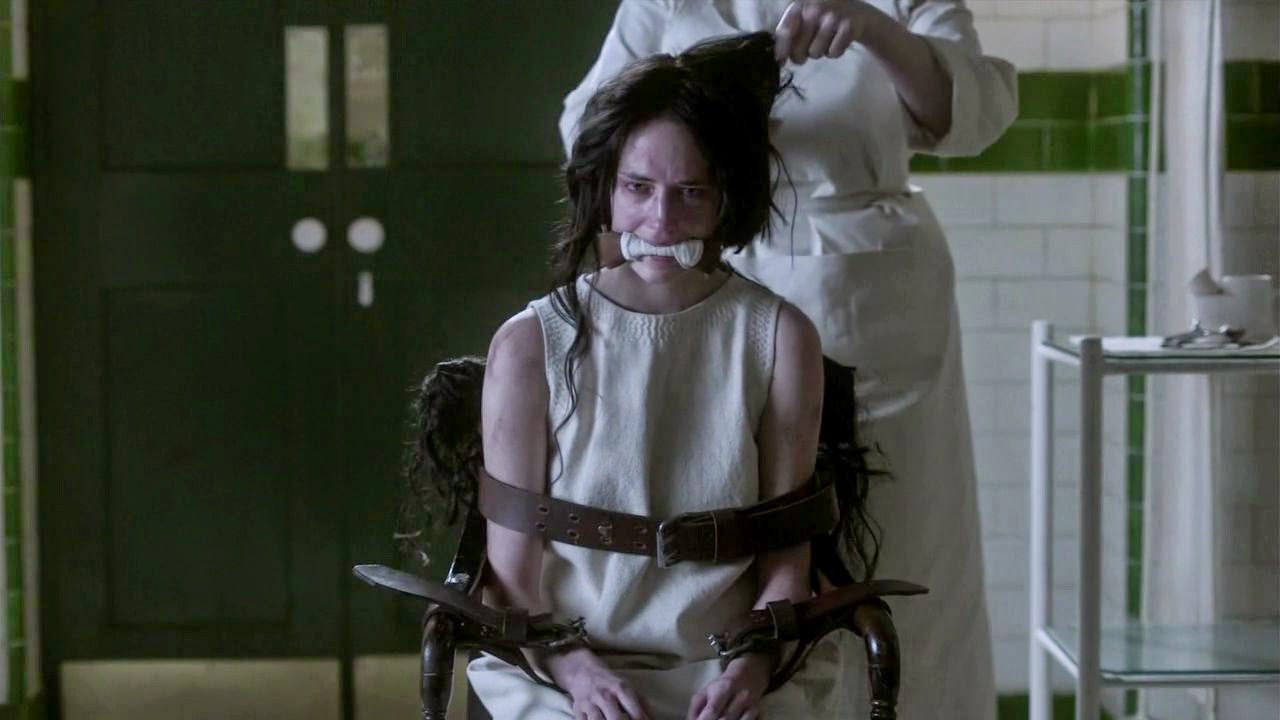
But modern medicine doesn't believe in Satan. Vanessa is sent to the Banning Clinic -- an asylum -- where she is diagnosed with female hysteria. She is treated with ice baths and is eventually trephined. (A hole is bored into her skull, during which the surgeon finds an apparent growth beneath her scalp -- a budding horn?) These incidents can be interpreted as a feminist indictment of patriarchal science, which punishes women for their healthy sexual desires. But one can more easily interpret them as Christian critiques of scientism and atheism. After all, Vanessa is not mentally ill. She really is possessed by Satan. After Vanessa is pacified, she is deemed cured and released. She discovers her latent psychic powers, including a mental connection to Mina, who seeks Vanessa's help in escaping Dracula. Because of this connection, Sir Malcolm takes Vanessa into his home, though he still hates Vanessa for betraying Mina. Season One is Sir Malcolm and Vanessa's quest for redemption. They team up to find Mina and cure her of vampirism. Along the way, Vanessa endures parallel struggles against both Satanic assault and the sensual temptations of modernity. Satan always appears disguised as a friend. Like the serpent in the Garden, he seeks to undermine her faith, softly saying, "You've always been drawn to the deep ocean. To the dark whisper. The mirror behind the glass eyes. To life at its fullest." A full life in which one follows every desire and passion. What Christians call sin. Today people rarely speak of sin, much less seriously, but it's a common word in Penny Dreadful. The characters don't agree on its merits. They praise sin, condemn it, indulge it, resist it, confess it, and accuse or forgive others of it. But the spectra of sin as a real force hangs over all.
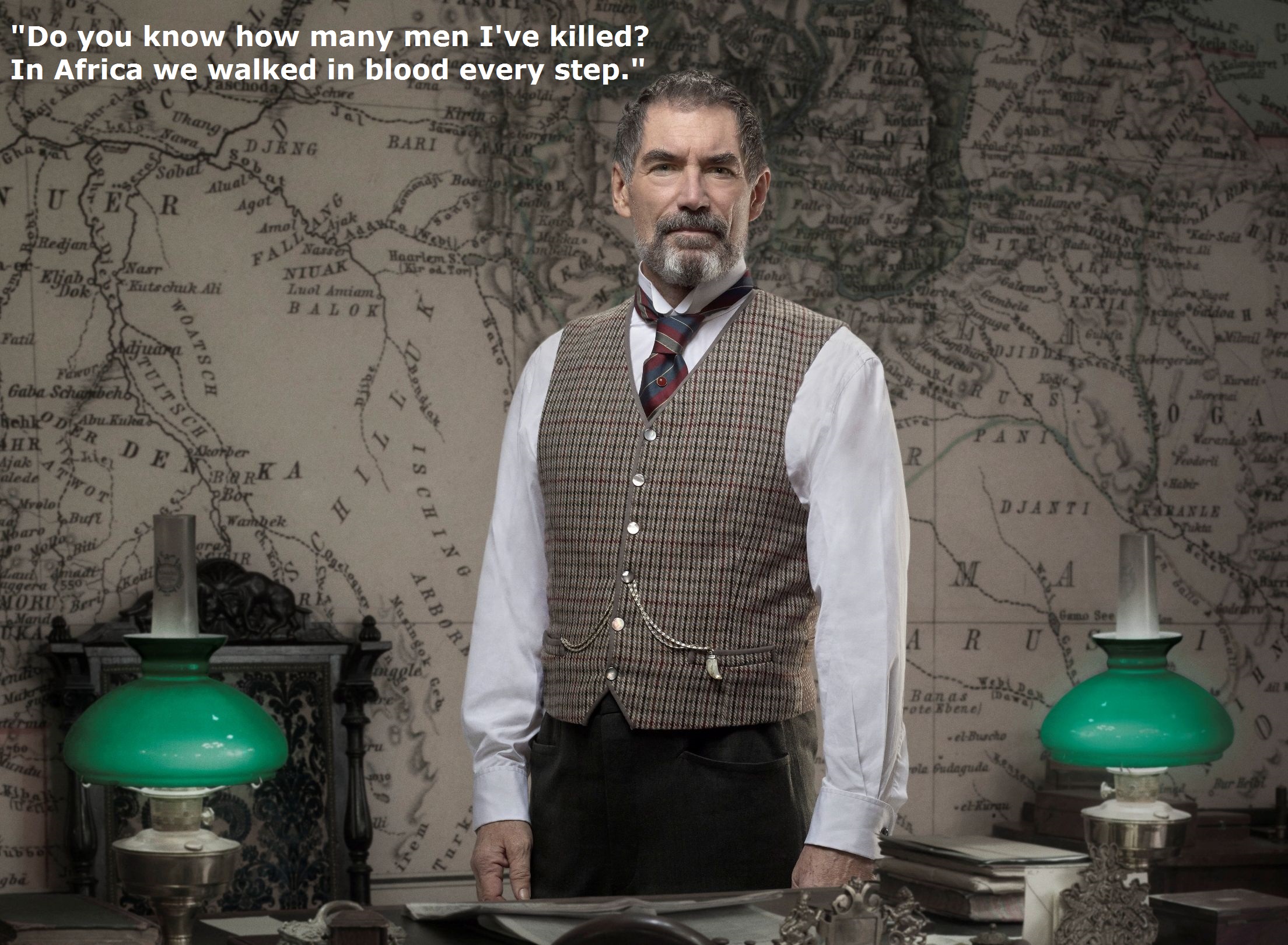
Many of Penny Dreadful's characters personify ideas, forces, or archetypes larger than themselves. Sir Malcolm is an African explorer. He symbolizes white, European patriarchy. He even has a loyal African servant, Sembene (Danny Sapani). But Sir Malcolm is not a God-fearing man. He represents modern Europe, one that puts its trust solely in guns and power rather than in Christ. Sir Malcolm's goal in life, his obsession, is to discover the source of the Nile River. "Who will claim the prize? Who will trace the mother of waters to its origins? World renown awaits." For this glory he abandoned his family while he explored the jungle. His son Peter died on their last expedition. He was a delicate young man who went to Africa to make his father proud. Sir Malcolm had promised to name a mountain after his dying son, but instead named it after himself. It's one of his many sins. Pride and selfishness in addition to adultery. And violence. "Do you know how many men I've killed? In Africa we walked in blood every step." The word "murder" is used. We may assume that Africa is not a gentle land and Sir Malcolm did not kill on a whim. But imperialism and colonialism corrupt the soul, and reap bitter fruits for all involved, as becomes increasingly evident over the course of three seasons. To assist in their search for Mina, Sir Malcolm and Vanessa recruit a young Victor Frankenstein (Harry Treadaway), an impoverished doctor engaged in research. Which is interrupted by the return of his first creation (Rory Kinnear), whom the doctor abandoned in fear right after he came to life. This monster has several names as the series progresses, beginning with Caliban. As in Shelley's novel, he hates Frankenstein for abandoning him, and demands the doctor build him a mate. Despite Caliban's periodic harassments, Frankenstein manages to keep his work secret from Vanessa and Sir Malcolm as he helps them seek Mina.
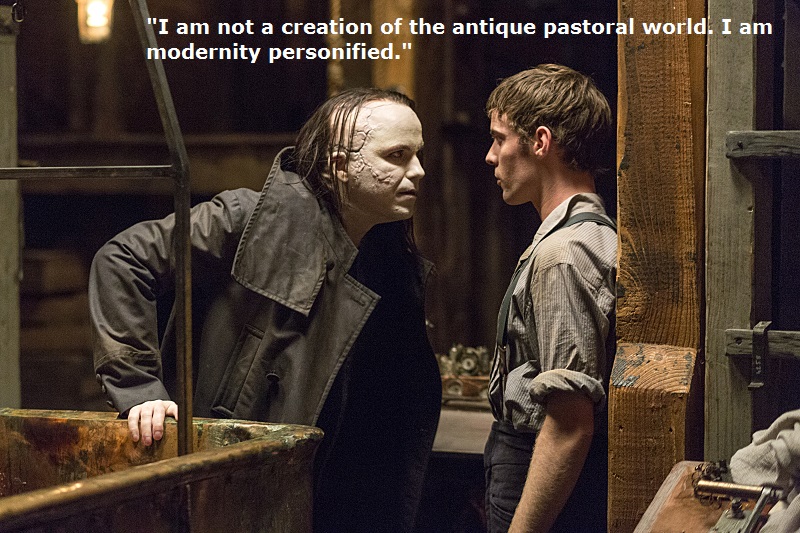
Frankenstein is a man of contradictions. A calculating materialist whose heart pines for an idyllic past. When Vanessa sees books of Romantic poetry in his medical bag, he explains, "Man does not live only in the empirical world. We must seek the ephemeral or why live?" But Caliban mocks his maker's romanticism. "I am not a creation of the antique pastoral world. I am modernity personified. Did you not know that's what you were creating? The modern age. Did you really imagine that your modern creation would hold to the values of Keats and Wordsworth? We are men of iron and mechanization now. We are steam engines and turbines." Strangers assume that Caliban's scarred face resulted from an industrial accident. Factories had spread across England by the late 19th century, displacing traditional agrarian communities. Sharp contrasts are drawn between Frankenstein's boyhood pastoral wanderings, and his current life in a grimy London tenement. (Much of Penny Dreadful was filmed in Dublin, which better resembles the London of 1891 than does today's London.)

As in the novel, Frankenstein's sin is his pride in scientific materialism. "Do you believe in fate?" he asks Van Helsing (David Warner). "I don't mean justice. I mean retribution. I mean facing the consequences of your actions that have produced catastrophe. A sin that is everlasting." The themes and archetypes in Penny Dreadful are explicit, from The Fall in the Garden, to Caliban's self-assessment. But John Logan's writing is literate, at times even poetic. The show is replete with quotable lines and memorable speeches. The music is sumptuous and affecting. Vanessa also recruits an American cowboy, Ethan Chandler (Josh Hartnett), after seeing him perform at a Wild West Show. She imagines his sharp shooter skills will prove useful on a vampire hunt. Chandler boasts to the public of surviving Custer's Last Stand, but when Vanessa later challenges him, he happily admits that it's "a tall tale." America's Wild West is fading into the past, commodified by showmen and carnival barkers. Chandler is an enigmatic rogue. As Vanessa correctly assesses, he's more complicated than he likes to appear. He left New Mexico Territory to evade his father, a powerful cattle baron. He committed some terrible "sin" back home, the details of which we only learn in Season Three. For now, all we have is his cryptic remark, "We've all done things to survive. There are such sins in my back it would kill me to turn around."
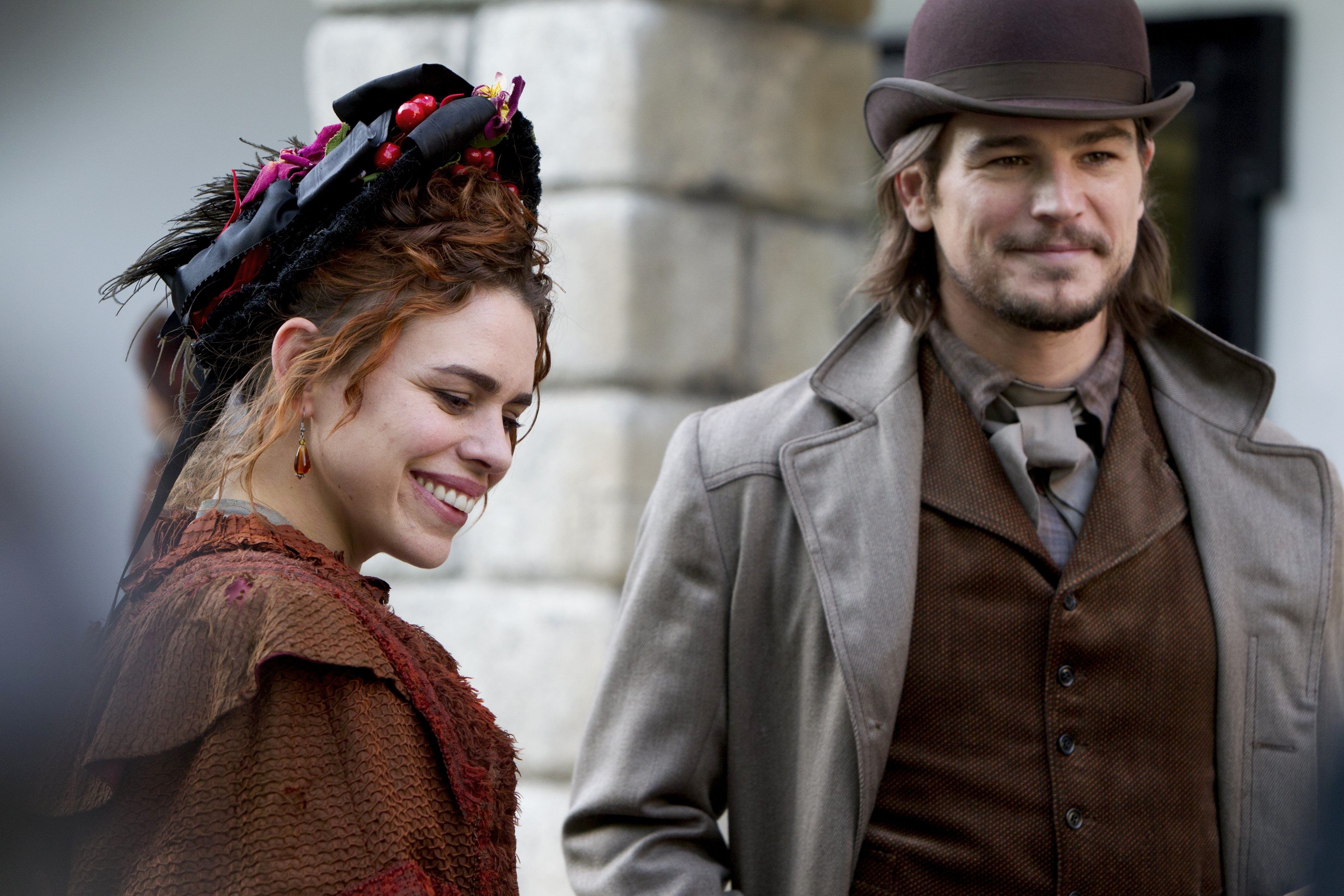
After his first grisly night killing vampires, and already having much sin and blood on his conscience, Chandler declines to further assist Sir Malcolm and Vanessa. "I've been a hired gun before. It doesn't suit me. There's no exultation in killing for gold." But he relents after meeting Brona Croft (Billie Piper), an Irish prostitute dying of consumption (as tuberculosis was called by Victorians). Brona needs money for medicine. And Sir Malcolm pays well. Chandler has a classic White Knight's peculiar sense of honor. He'll happily seduce a married woman, ignoring her sacred vows to another man. Yet he'll risk his life to rescue a beautiful damsel in distress, however unsavory her past. Within Chandler's chivalry are the seeds of feminism. The notion that if a woman sins, some man drove her to it. Little wonder that he is attracted to Brona, for she is feminism personified. This becomes explicit as the series progresses and Brona's character develops. By Season Three, her misandry will be epic.
But in Season One, Brona
still accepts guilt. "We've all sinned. No one knows that
better than me." Yet she makes excuses. She had been engaged
to a "brute" in Belfast. After she left him, rather than find a
nicer man, she turned to prostitution. As she explains to
Chandler, "There was no money. It's what you did. You married
or you whored."
That's Brona's worldview. Sell your body to a husband, or rent it to a series of men. Although she also blames the Industrial Revolution for her immoral choices. "One by one we were all replaced by better, new machines. No harm. There's always a way to make a living when you've a bit of flesh, isn't there?" Worse than Brona is Dorian Gray. "He's a devil, that one," she says of him. Not literally true, but close enough. Whereas the Dorian of Oscar Wilde's novel was 40 but looked 20, Penny Dreadful's Dorian is centuries old. He is immortal and therefore amoral. Confidant that he will never die and face Judgment, he lives by Satan's Law: Do as thou will shall be the whole of the law. Dorian is a charming but frivolous man. Immortality brings boredom. Apart from God and Devil, living in limbo, he struggles to find new thrills. He hires Brona for an erotic photo shoot. When Brona coughs up blood, he rushes forward to make love to her, growing more excited as she spits blood upon his face. "I've never fucked a dying creature before. Do you feel things more deeply, I wonder?"
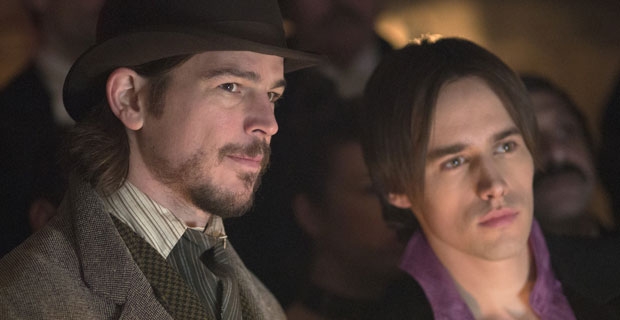
Dorian also seduces Chandler, though the cowboy makes the first move. While we expect this of the bisexual Dorian, it's a surprising turn for Chandler. (His first and last gay act in the series.) Some Penny Dreadful fans have celebrated Dorian as a positive gay icon. Yet Dorian represents amorality, a doctrine of liberation to Satanists, but evil to Christians. Thus, Chandler's liaison with Dorian can be interpreted as a further fall from grace.
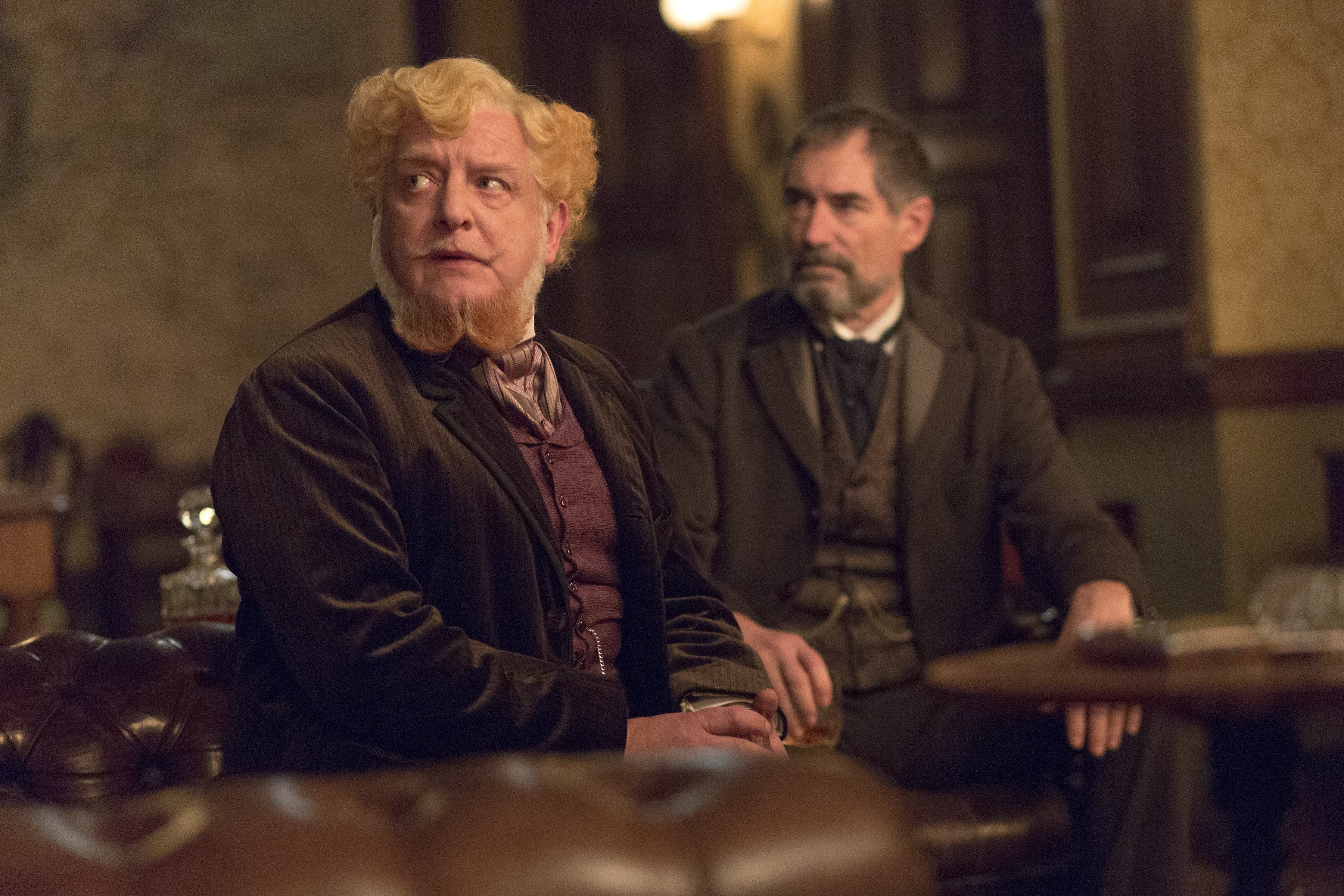
After a vampire's corpse is found to be covered with hieroglyphics, Sir Malcolm and Vanessa consult an Egyptologist, Ferdinand Lyle (Simon Russell Beale). Lyle is shocked that one image shows a union of two Egyptian deities, Amun-Ra and Amunet. Ancient prophecies predict that, should they ever unite sexually, the Hidden Ones will emerge and Creation will plunge into eternal darkness. It's a prophecy for the Apocalypse -- but with Evil triumphant. Lyle speculates that Vanessa is the reincarnation of Amunet. And that Amun-Ra is seeking her. Where is he? Could Amun-Ra be another name for ... Satan? "I would not tell Miss Ives this," Lyle advises Sir Malcolm. "After all, who wants to know they're being hunted by the Devil?" Lyle invites Sir Malcolm and Vanessa to a party. She meets, and is attracted to, Dorian. Then Madame Kali (Helen McCrory) leads a séance. But she is upstaged by Vanessa, who channels Peter, then Mina, and finally Amunet. All take a turn speaking through Vanessa.
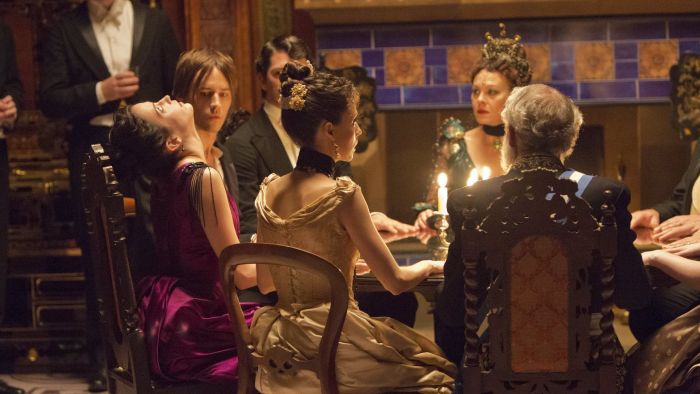
Peter recounts his death. Mina, vampirically possessed, accuses her father of infidelity. Amunet snarls cryptic visions of the apocalypse. This séance is arguably Eva Green's most brilliant scene among her many brilliant performances in Penny Dreadful, complete with changing voices and extreme bodily contortions and facial expressions. Hearing his children's accusations brings Sir Malcolm to tears. Vanessa storms out of Lyle's house. Her mind and spirit in turmoil, she is oblivious to the heavy rain, grabs a passing stranger, and practically rapes him in public. Dorian watches from a distance. Playing the voyeur. Intrigued. His attraction to Vanessa increasing. It is implied that, since her seduction of Mina's fiancé, Vanessa has remained celibate. But just as Satan tempted Vanessa into her first sexual sin, now Amunet (we assume) drives Vanessa to her second. Her sex life is sparse (two acts of fornication), yet full enough to cause her guilt. Modern folk would laugh, but it was perhaps a common outlook for Victorian women of respectable upbringing.
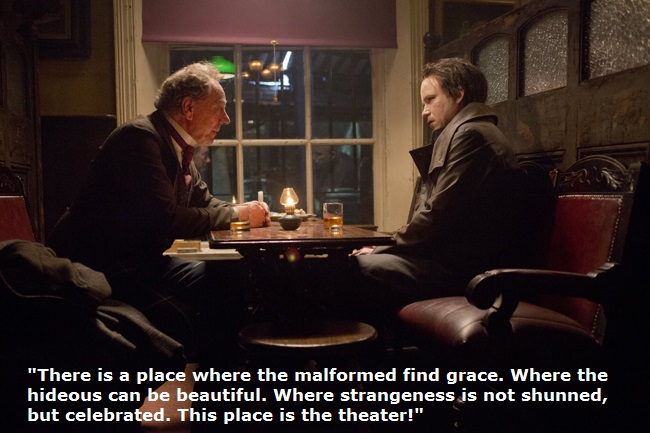
Upon arriving in London, Caliban was beaten by a mob. Vincent Brand (Alun Armstrong), actor and theatrical manager, finds him lying in an alley. Taking pity, Vincent provides him with dinner and a job. "There is a place where the malformed find grace. Where the hideous can be beautiful. Where strangeness is not shunned, but celebrated. This place is the theater!" Vincent's theater is the Grand Guignol, presenting bloody tales of terror. It's not what he'd like to do, but it's what the public wants. The worship of science, reason, and industry have influenced the arts. Shakespeare is out. Ibsen (Vincent grimaces) is in. Romanticism and beauty are out. Naturalism and realism are in. Things were so much finer in his youth. "When there was a value placed upon the ineffable and the exalted. When this city aspired to Jerusalem." Vincent hires Caliban to be their "stage rat," the man responsible for working all the trapdoors, and lights, and sound effects, and scenery changes. It is Vincent who christens Caliban, taking the name from Shakespeare's The Tempest. "Of course, in our version Caliban eats Prospero." Caliban finds a home at the Grand Guignol. But trouble erupts when Maud (Hannah Tointon), an actress, takes pity on him. He mistakes Maud's kindness for love. His clumsy attempts at courtship create a Me Too moment. Vincent must fire Caliban. Vincent would rather sack Maud, but, he laments, the public pays to see her. Caliban returns to Frankenstein, explaining, "Because I have nowhere else. No. I have no one else. Is that not the saddest of all, creator? I'm again cast on your barren shores." Angry at his creator, Caliban has already murdered two of Frankenstein's friends. The doctor now sees an opportunity to kill his monster. But as Caliban relates his woes, despairing that any woman, natural born or man-made, could love him, Frankenstein pities Caliban and decides against killing him.
Penny Dreadful's large cast is almost uniformly excellent. But Eva Green and Rory Kinnear are the two standouts. Caliban's speech, and Kinnear's rendition of it, is a thing of beauty and grace. Vanessa ruminates in a park opposite a Catholic church. She feels unworthy to enter. Dorian emerges from the church. (He later says he likes the ritual of Catholicism, something Oscar Wilde also reputedly said.) Intrigued by their meeting at the séance, Vanessa follows Dorian, engages him in conversation, and invites him to dinner. Essentially, she is asking him for a date. This is forward behavior for a Victorian woman, and Vanessa is ambivalent about her assertiveness. She is torn between sexual liberation and Christian self-restraint. "There are things within us all that can never be unleashed," she later tells Dorian. Critics have praised Vanessa as a feminist icon, and Penny Dreadful as an indictment of "oppressive patriarchy." Yet conversely, one can admire Vanessa not for her sins (which some see as liberating and empowering), but for her contrition. Are her guilty prayers a burden of patriarchal oppression, or the Christian road to true freedom? Dorian is intrigued by Vanessa. He calls her the greatest mystery in all of London. He senses that she too is immortal. He tries to tease the details out of her, hinting, "But you do understand eternity. I know that. The workings of time." But Vanessa is clueless. She knows that Satan wants her soul, but not why. She doesn't know that she is the incarnation of Amunet.
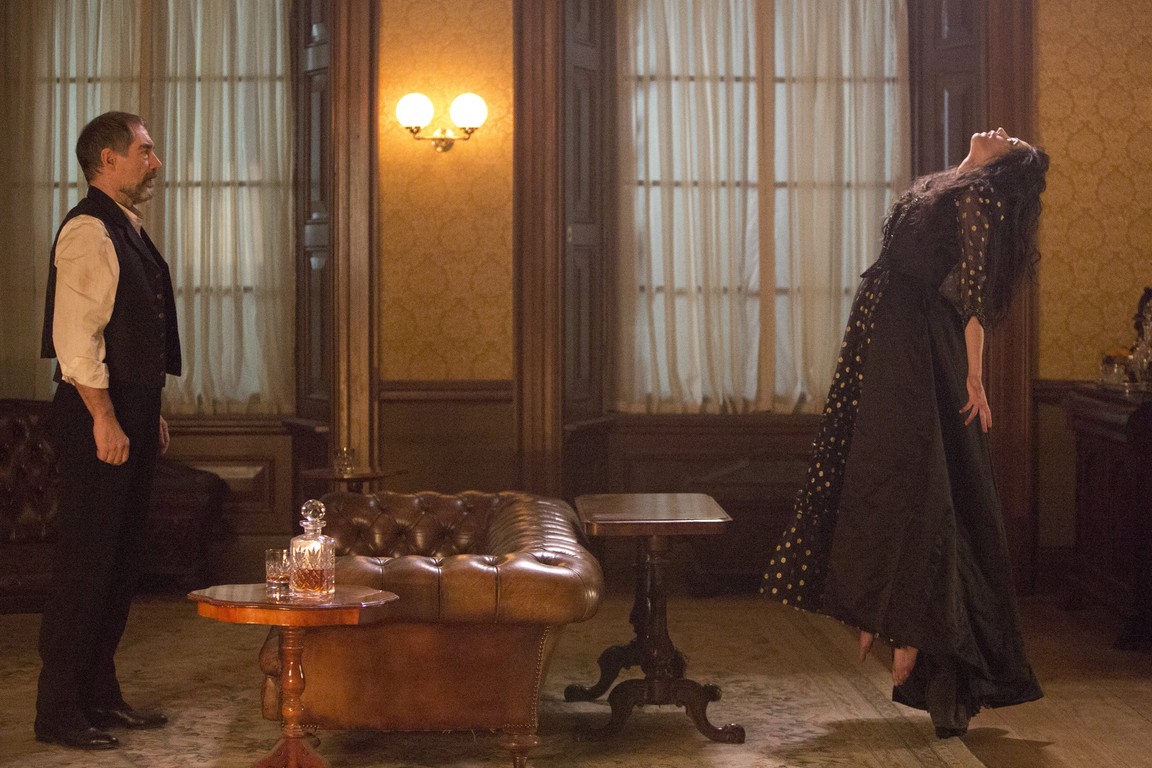 Vanessa is wise to exercise self-restraint. No good comes when she lapses. Her third sexual sin is with Dorian. During the act, a dark force possesses Vanessa. (Yes, it's Satan.) She turns feral, cutting Dorian with a knife. This excites him further, but Vanessa is shocked by her savagery and rushes from his bed. She arrives home looking like a rape victim. Whereupon she levitates. This final sexual sin has opened her to full Satanic possession. The next morning, Vanessa stretches coquettishly on a sofa, blissfully musing, "To be beautiful is to be almost dead, isn't it? The lassitude of the perfect woman. The languid ease. The obeisance. Spirit drained. Anemic. Pale as ivory and weak as a kitten." It's a modern feminist's derision of the Victorians' conception of "the perfect woman." Satan has entered Vanessa through sexual sin, and now she's spouting feminism.
These themes are explicit. According
to Frankenstein, "Miss
Ives is manifesting a deep psycho-sexual responsiveness. I would
say the root of her condition lies there. In guilt. Something or
someone has triggered it." Frankenstein nods. "All right. Let's imagine this. She has an erotic encounter with this man. Perhaps her first. We don't know. And it evolves into some sort of sexual extremity or perversity that produces feelings of guilt or shame. That might stimulate psychological break or disassociation which ..."

He stops when he sees a spider on a card he's holding. Then hundreds of spiders emerge from the table. A supernatural event, proving that Frankenstein's materialist explanation is only half correct. Vanessa's "illness" is caused not by sexual trauma, but by sexual sin. Frankenstein can't see it because, as he says, "I believe in everything except God." His "everything" includes drugs. Frankenstein suffers from a morphine addiction. "The manipulation of the body through science," he calls it. Another corruption from modernity. Frankenstein's addiction will worsen as the series progresses. Sir Malcolm has no love for Vanessa. As he once put it, "I would sacrifice you to save my daughter. I would choose her over you. I might even hope I get the chance. But until then you are invaluable to me. Your connection to Mina is my lifeline. So I must keep you alive." Now Sir Malcolm refuses to call a priest to exorcise Vanessa. He sees her possession as an opportunity. With her soul suspended between two worlds, the living and the dead, her connection to Mina might intensify. Sir Malcolm urges Vanessa to "reach out" and find Mina. It's a cruel risk to Vanessa, but as Sir Malcolm once said of Mina, "To save her, I would murder the world." Chandler says he doesn't believe in God. Yet he carries a St. Jude medal because Brona asked him to. The patron saint of lost causes, she explained. So when Vanessa begs Chandler to shoot her, to end her torment, he instead turns desperately to faith. Praying in Latin (his wealthy father bought him a fine education), he calls upon St. Jude and uses the medal to successfully expel Satan from Vanessa. Christian faith has defeated Satan. For now.
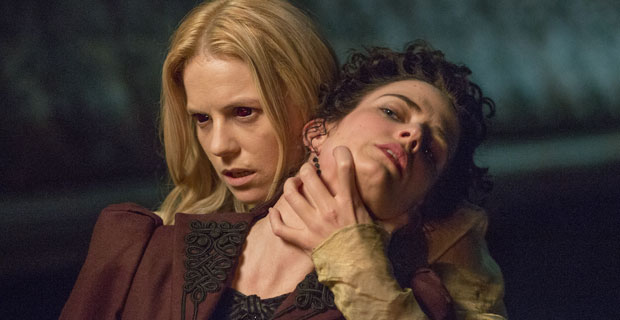
As Sir Malcolm hoped, Vanessa has discovered Mina's location. Sir Malcolm, Sembene, Chandler, Frankenstein, and Vanessa invade the vampires' lair. A battle ensues, during which Mina is about to bite and transform Vanessa, because Dracula (who is elsewhere) wants Vanessa for his bride. (Implying that perhaps Dracula, not Satan, is Amun-Ra.) Sir Malcolm shoots Mina to save Vanessa. Wounded, Mina pleads, "I'm your daughter!" Realizing he cannot save Mina, Sir Malcolm glances at Vanessa, then says, "I already have a daughter." He destroys Mina with a final bullet, thus ending her torment. Season One began with Sir Malcolm and Vanessa as cold allies, cooperating to expiate their respective sins. It ends with them as surrogate father and daughter. They will continue to fight Satan and Dracula over the next two seasons. Chandler returns to find Brona on her deathbed. Frankenstein tells Chandler that Brona hasn't long to live. He asks Chandler to go and fetch water. With Chandler gone, Frankenstein discusses the afterlife with Brona. She admits to fearing Judgment. "I hated that fucker God, you see. Cruel, he was. But now I'm frightened."
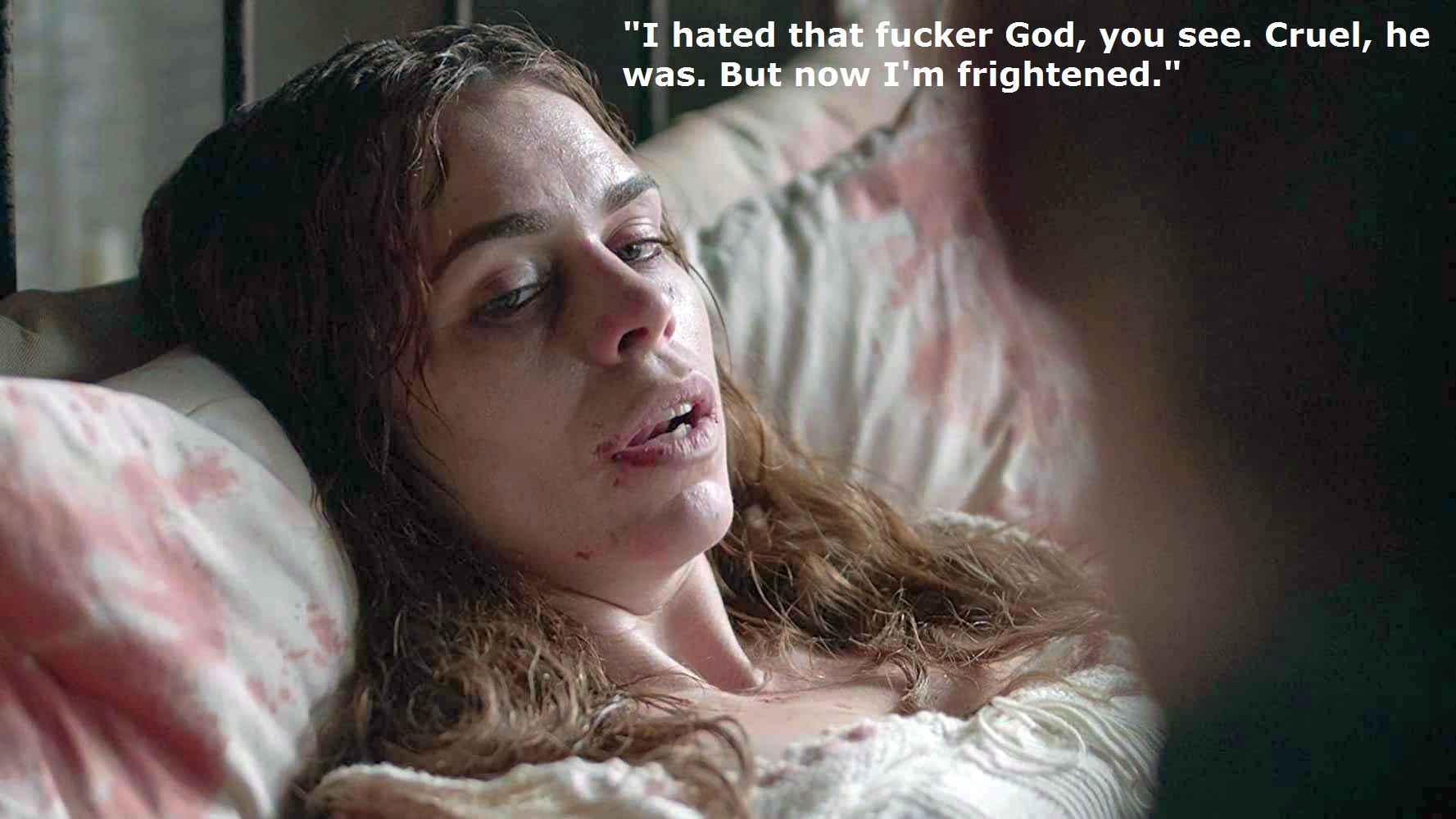 Frankenstein comforts, "I believe in a place between Heaven and Hell. Between the living and the dead. A glorious place of everlasting rebirth. Perhaps even Salvation. Do you believe in such a place?" She nods. He continues, "Now, there is a price to pay for such a passage, as there is with all things. I know that you'll pay it easily." He then smothers Brona with a pillow. Murder or euthanasia? He didn't ask permission. Didn't explain what he intended. But, well, she was dying anyway. Frankenstein does not believe in God, but he believes in Salvation through Science. Later, while Chandler grieves at Brona's bedside, Frankenstein assures him, "Her passing was a thing of grace, I promise you. Spend your time with her. And don't worry. I'll take care of the body." Season One ends with him preparing to resurrect Brona as a mate for Caliban. As Chandler mourns over a drink in a bar, two Pinkerton agents try to arrest him. They were hired by his father to return the prodigal son to America. Chandler evades them. Later that night, the agents return, prepared for rough stuff. What they didn't prepare for was Chandler turning into a werewolf.
Dorian calls upon Vanessa, hoping to reconnect. But after surviving weeks of Satanic torment, Vanessa wants no more sexual contact with the libertine. "Mr Gray. I am not the woman you think I am. And with you, I am not the woman I want to be. It's too dangerous. ... Between us there's a rare connection, I won't deny it. But that very intimacy released something unhealthy in me. Something I cannot allow." Season One ends as it began -- with Vanessa reaching out to God. She enters the church she had earlier only observed from outside. She approaches a priest, and asks about the ritual of exorcism. She senses that Satan, though in abeyance, still has a grip on her."
"What do you fear, girl?"
asks the priest. The priest's question hints at what will be Vanessa's ultimate temptation. If she is the reincarnation of Amunet, courted by both Dracula and Satan, prophesied to rule for eternity as the Mother of Evil and indulge her every passion and desire, is that something that she really wants to give up? The answer to that we will learn after two more seasons (see my review for Season Two).

|
"Communist Vampires" and "CommunistVampires.com" trademarks are currently unregistered, but pending registration upon need for protection against improper use. The idea of marketing these terms as a commodity is a protected idea under the Lanham Act. 15 U.S.C. s 1114(1) (1994) (defining a trademark infringement claim when the plaintiff has a registered mark); 15 U.S.C. s 1125(a) (1994) (defining an action for unfair competition in the context of trademark infringement when the plaintiff holds an unregistered mark).font>


